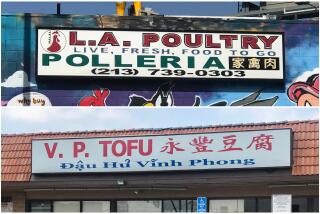Pastors Hail Unity on 7th Anniversary of Riots
- Share via
How good and pleasant it is when brothers
live together in unity! --Psalm 133:1
*
That Bible verse, along with the hymn “Amazing Grace,” were repeated in English and Korean on Thursday as African American and Korean American pastors observed the seventh anniversary of the 1992 Los Angeles riots, reflecting on changes wrought by the turmoil.
“We’ve come a long way,” the Rev. Lonnie Dawson, senior pastor of New Mt. Calvary Baptist Church in South-Central, told more than 100 guests at a Koreatown breakfast. “We can get along.”
In the days after the riots, a group of African American and Korean American pastors formed an organization to help foster reconciliation.
But unlike similar efforts that later cooled, members of African American/Korean American Christian Alliance have continued to meet every month for prayers and breakfast.
Their seven-year journey has taught them “how much we are the same,” said Dawson, co-chairman of the group.
Fellow co-chairman the Rev. Jung-Nam Lee, of Valley Park Korean Baptist Church in North Hills, agreed.
“Whether we are Korean or African American, we have the usual life’s concerns: the safety of our children, their education, insurance premiums going up,” he said.
When the Rev. William Thurmond, pastor of Park Windsor Baptist Church, sought to learn more about Koreans by visiting South Korea, he said he discovered how much Koreans and African Americans have in common.
He saw farmers tending crops and was reminded of his relatives who worked on farms in the South. When he was told how Koreans suffered under Japan’s 35-year colonial rule, he identified with their oppression.
“I was able to put that together and say, ‘Hey, we are brothers and sisters.’ ” he said. “We ought not be trying to beat up on each other, but learn about each other.”
Thurmond has, in turn, taught African American history at Yongnak Presbyterian Church near downtown Los Angeles, one of the largest Korean churches in the nation.
The two groups also have come to know their differences.
Korean Americans, said Dawson, are formal and not as “free-spirited” as African Americans.
So black ministers have taught Korean pastors to hug, Lee said, an uncommon practice among first-generation Korean men.
Korean American ministers say they used to feel uneasy in South-Central.
Now, said Lee, “When we go to coffee shops there now, we feel comfortable. We’ve learned that South-Central isn’t all gangs.”
The Rev. Hak-Sun Pak, past co-chairman of the group, said the ministers’ group is the “finest product” to come out of the tragedy of seven years ago, spreading the messages of hope, love and understanding.
Across town in Little Tokyo, similar themes were spoken at a panel Thursday.
“We need dynamic, quality education--we need to learn about each other,” said Stewart Kwoh, president of the Asian Pacific American Legal Center.
“If we do not have a deep commitment to diversity and understanding, and . . . making it our best strength, we cannot succeed as problem solvers,” he said at a symposium on race relations held at the Japanese American National Museum.
Most city residents apparently agree with the notion of tolerance.
A recent Los Angeles Times poll found that an overwhelming majority of Angelenos said people of different racial and ethnic groups who move into their community do not have much effect on the quality of their lives.
More to Read
Sign up for Essential California
The most important California stories and recommendations in your inbox every morning.
You may occasionally receive promotional content from the Los Angeles Times.













